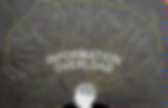

Information overload. A Brain Boost for information overload. It’s called a cortically coupled computer vision (C3Vision) system, and it uses a computer to amplify the power of the quickest and most accurate tool for object recognition ever created: the human brain.
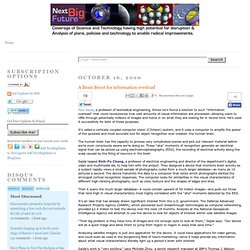
The human brain has the capacity to process very complicated scenes and pick out relevant material before we’re even consciously aware we’re doing so. These “aha” moments of recognition generate an electrical signal that can be picked up using electroencephalography (EEG), the recording of electrical activity along the scalp caused by the firing of neurons in the brain Then it scans the much larger database—it could contain upward of 50 million images—and pulls out those that rank high in visual characteristics most highly correlated with the “aha” moments detected by the EEG.
It’s an idea that has already drawn significant interest from the U.S. government. “Their big problem is they have tons of images and not enough eyes to look at them,” Sajda says. Information-overload_landscape.png (Image PNG, 1238x877 pixels) - Redimensionnée (88. Info Overload: The Problem. This will be post #1 of 2 posts on today's information overload problem and how we can cope.
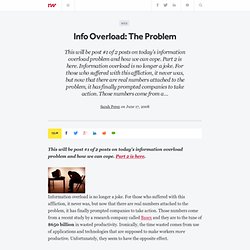
Part 2 is here. Information overload is no longer a joke. For those who suffered with this affliction, it never was, but now that there are real numbers attached to the problem, it has finally prompted companies to take action. Those numbers come from a recent study by a research company called Basex and they are to the tune of $650 billion in wasted productivity. Ironically, the time wasted comes from use of applications and technologies that are supposed to make workers more productive.
Information Worker Overload This $650 billion dollar problem made the headlines this week, getting write-ups in both the Wall Street Journal and the New York Times. Often, workers are dropping high-level tasks to deal with mundane, low-priority tasks that come through via these unnecessary interruptions. "Productivity" Apps Big tech companies are worried, too. This group's mission is to: L’infobésité, une pandémie à traiter. Les éditeurs de solutions de gestion des connaissances et autres structures conseil dans l’amélioration des processus décisionnels émettent régulièrement des analyses sur le problème de la surcharge informationnelle qui guette les travailleurs du savoir.
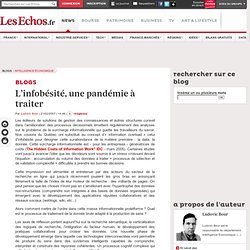
Infotention. Infobésité. Yes it IS Information Overload, Clay Shirky, not only Filter Failure - nathanzeldes.com. "information overload" Digital Natives and Information Overload. STOP Searching. Start Finding. Contemplative Computing. Focus-distraction-age.jpg (1024x746) The Hierarchy of Digital Distraction. Vers une informatique contemplative. Par Rémi Sussan le 15/07/11 | 6 commentaires | 5,465 lectures | Impression Alex Soojung-Kim Pang, du Peace Innovation Lab à Stanford et du Groupe d’étude des systèmes sociaux numériques de Microsoft Labs, a débuté son intervention à la conférence Lift en nous suggérant une petite activité : “consultez vos e-mails” a-t-il demandé, “vous allez le faire de toute façon”. Mais il nous a demandé d’observer notre comportement à ce moment : il semble en effet qu’en majorité, les internautes retiennent leur respiration au moment de cette consultation.
Ce qui a pour conséquence d’augmenter notre CO² dans le sang et donc notre sensation d’anxiété. Voilà pour lui un exemple de la manière dont les technologies modernes provoquent des stress. Image : Alex Soojung-Kim Pang sur la scène de Lift, photographié par Swannyyy. Infotention Filters - What combination of mental and online tools can deal with information overload? Managing Information Overload. Recovering from information overload - McKinsey Quarterly - Organization - Talent. For all the benefits of the information technology and communications revolution, it has a well-known dark side: information overload and its close cousin, attention fragmentation.
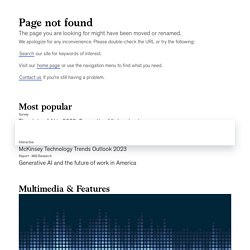
These scourges hit CEOs and their colleagues in the C-suite particularly hard because senior executives so badly need uninterrupted time to synthesize information from many different sources, reflect on its implications for the organization, apply judgment, make trade-offs, and arrive at good decisions. The importance of reserving chunks of time for reflection, and the difficulty of doing so, have been themes in management writing for decades.
Look no further than Peter Drucker’s 1967 classic, The Effective Executive, which emphasized that “most of the tasks of the executive require, for minimum effectiveness, a fairly large quantum of time.” Yet they are devilishly difficult to implement, and getting more so all the time. Better solutions exist, and they aren’t rocket science. The perils of multitasking Focus. Death by Information Overload « Just Another ARTS2090 Blog. Howard Rheingold devised the term ‘Infotention’ “to describe the psycho-social-techno skill/tools we all need to find our way online today, a mind-machine combination of brain-powered attention skills with computer-powered information filters.”
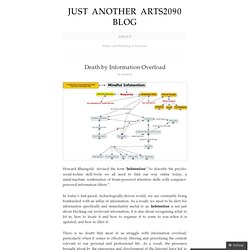
In today’s fast-paced, technologically-driven world, we are constantly being bombarded with an influx of information. As a result, we need to be alert for information specifically and immediately useful to us. Infotention is not just about blocking out irrelevant information, it is also about recognising what to let in, how to locate it and how to organise it to come to you when it is updated, and how to filter it. There is no doubt that most of us struggle with information overload, particularly when it comes to effectively filtering and prioritising the content relevant to our personal and professional life.
How to Reduce Information Overload. We live in a world full of information being thrown at us, every moment of the day, constantly demanding our attention.
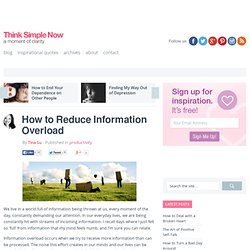
In our everyday lives, we are being constantly hit with streams of incoming information. I recall days where I just felt so ‘full’ from information that my mind feels numb, and I’m sure you can relate. Information overload occurs when we try to receive more information than can be processed. The noise this effort creates in our minds and our lives can be overwhelming. Here are the reasons that I decided to consciously reduce my information appetite: Productivity Loss – In the face of too much information, we can easily get lost in the details.
Too much of a good thing is never good, and this is especially true of information. The following are ways to reduce your consumption to diminish the chaos and bring peace of mind: Reduce Information Intake to the Essentials – Decide what your essentials are. About the author. What Information Overload Does To Your Brain. Souffrez-vous du syndrome de surcharge d’information ? TIC- L’infobésité, mal de notre société de l’information - Culture et TIC. Surcharge informationnelle. Un article de Wikipédia, l'encyclopédie libre.
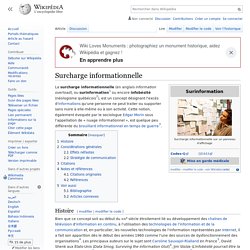
Crap detection, Evaluate. 60 Seconds - Things That Happen On Internet Every Sixty Seconds. World Wide Web is growing at rapid pace.

On average, more than a billion new pages are added to it every day. The Internet Is Full. The Information Overload Research Group. Infogineering - Master Your Information. Information Overload is an increasing problem both in the workplace, and in life in general.
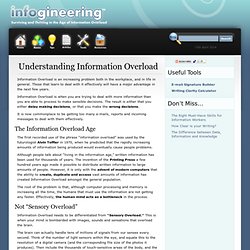
Those that learn to deal with it effectively will have a major advantage in the next few years. Information Overload is when you are trying to deal with more information than you are able to process to make sensible decisions. The result is either that you either delay making decisions, or that you make the wrong decisions. It is now commonplace to be getting too many e-mails, reports and incoming messages to deal with them effectively. Information Overload: Solutions for Different Personality Types. Information overload. In recent years, the term "information overload" has evolved into phrases such as "information glut" and "data smog" (Shenk, 1997).
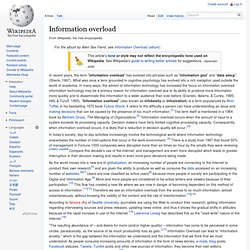
What was once a term grounded in cognitive psychology has evolved into a rich metaphor used outside the world of academia. The age of information overload. Victoria Belmont finds out who is really in charge - our technology or us? From reading emails to managing status updates on mobile devices 24/7 with an all-you-can-eat data plan - we are consuming information like never before. Forget about describing bytes as mega and giga, think exa and zetta because by 2016 there may be the data equivalent of every movie ever made hurtling across the internet every three minutes. While that may seem like way too much for a person to watch, an academic study by the University of California, San Diego, suggests that current data levels are the equivalent of each US citizen consuming 12 hours of information - or media - each day.
An average US citizen on an average day, it says, consumes 100,500 words, whether that be email, messages on social networks, searching websites or anywhere else digitally. "In principle, you can have more than 24 hours of consumption in a day. " Tasered with a text. Measuring Consumer Information. Sensory overload. Sensory overload occurs when one or more of the body's senses experiences over-stimulation from the environment. There are many environmental elements that impact an individual. Examples of these elements are urbanization, crowding, noise, mass media, technology, and the explosive growth of information.[1] Sensory overload is commonly associated with Sensory processing disorder. AttentionDoesntScale-Whitepaper-Nov2012.pdf.